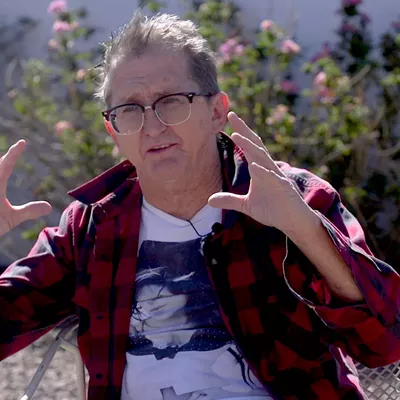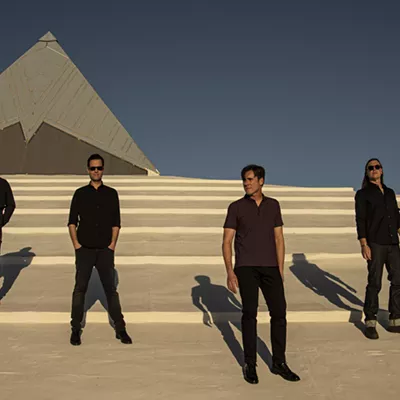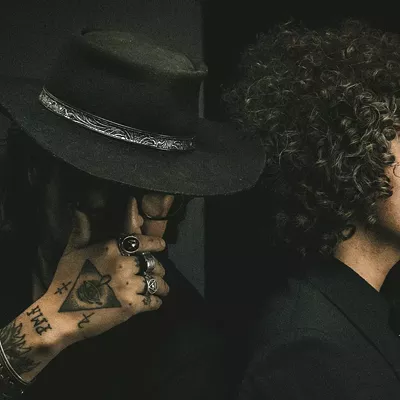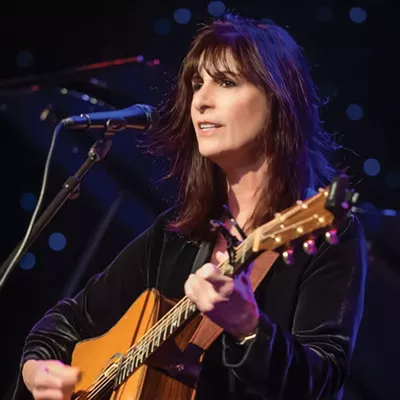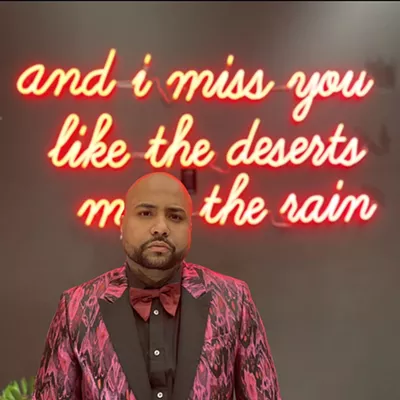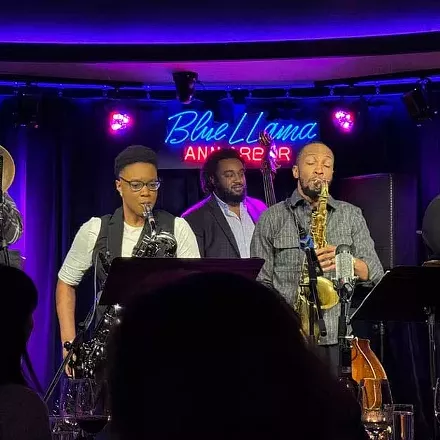Tucson's resident icon of musical unpredictability, Howe Gelb, is back in a big way with a new CD and an expanded version of his shape-shifting, several-decades-running band, Giant Sand.
Now dubbed Giant Giant Sand, and sporting no less than 12 players spread over two continents, Gelb and Giant Giant Sand have produced what might be the best record of his three-decades-long career—and it's a rock opera, no less.
Released June 12 on Fire Records, Tucson: A Country Rock Opera features 19 songs, 17 of them written by Gelb and/or fellow band members, and two cover songs. There's not a moment that isn't infused with beautiful or beautifully jagged melodies, and supple grooves and exquisite playing. There are finely placed Latin/border touches in the arrangements and commanding vocals by four different lead singers.
The expanded version of Giant Giant Sand includes some of Tucson's top younger musical talent and personalities: Gabriel Sullivan, Brian Lopez and Jon Villa. These guys are all band leaders and master collaborators in their own right, with more overlapping projects going on than it's possible to keep track of.
Giant Giant Sand also includes the striking vocalist Lonna Kelley from Phoenix; ace pedal-steel-guitar player and solo artist Maggie Björklund; and a pair of Danish string players, Iris Jakobsen and Asger Christensen. This is in addition to the stable Giant Sand lineup of the last few years: Gelb, Danish expatriate bass player Thøger Lund, and three more who still call Denmark home: drummer Peter Dombernowsky; guitar, lap-steel and mandolin player Anders Pedersen; and keyboard player Nikolaj Heyman.
The story of how Giant Giant Sand came together, and how Tucson: A Country Rock Opera came to be, is a convoluted tale, only a fraction of which can be told here. But the expanded band first came together when Gelb and Giant Sand were booked to play at the Wasserfest in Berlin last July. Urged by the local promoter to bring more players, Gelb brought Lopez, Sullivan and Villa. Lopez, in turn, suggested the Danish string players—who are from the same town in Denmark as the rest of band. And one of them was also born in Tucson.
With no rehearsal, the band played for three hours, with various combinations of musicians. The key moment came during a version of the Peruvian cumbia number "Caranito," as the band was transitioning from Lopez and Sullivan's opening set into the full band. Gelb describes it as "instantaneous combustion—the whole stage explodes, and we were all caught up in it. The crowd was caught up in it." At that moment, Giant Giant Sand was born.
The final pieces of the band were added in October, when Lonna Kelley and Maggie Björklund were added to the next Giant Giant Sand show, at the Heartland Festival in Vevey, Switzerland, for which Gelb was curating the music.
The majority of Tucson: A Country Rock Opera was recorded between Christmas and New Year's in Tucson, with all of the local players and Dombernowsky, but minus the string players, Heyman and Pedersen. The rest of the Danish crew recorded their parts in one afternoon session in Denmark in January, playing live with no additional overdubbing. Producer and musician John Parish (PJ Harvey, Eels, etc.) was supposed to mix the entire record, but became ill the morning it was to happen. The finished record is a combination of rough mixes from Wavelab Studio in Tucson, some Danish mixes, a few tracks from a Parish stand-in in the United Kingdom, and one from Switzerland.
None of this is even remotely obvious when listening to the album. It has an incredible richness and consistency of sound that in no way indicates it was pieced together. Gelb and his crew sound inspired and deeply immersed in the material, and Gelb's resonant, well-weathered voice just keeps getting better with age. Loping, twangy country rockers like "Forever and a Day," "Lost Love," "Undiscovered Country," "Thing Like That" and "We Don't Play Tonight," and the bluesy desert shuffle "Slag Heap," sit next to quiet, acoustic numbers like "Wind Blown Waltz," "Mostly Wrong," "Hard Morning in a Soft Blur" and "New River." Lopez takes the lead for the lovely "Love Comes Over You," as does Sullivan on "The Sun Belongs to You." Kelley almost steals the show with her jazz-noir number "Ready or Not"; duets with Gelb on "Not the End of the World"; and sings with Gelb, Lopez and Sullivan on The Band number "Out of the Blue." The hushed, deep-cosmos number "Recovery Mission," with backup vocals from Gelb's daughter Talula and some school friends, is quietly stunning; they seem to have created a whole new world out of the ether.
And the rock opera? Well, it didn't start out that way. This is not a Tommy, or The Wall, with a narrative line and obvious characters. It is, instead, according to Gelb a "pasticcio," or pastiche, "an opera assembled with songs not written for it." This is an opera that was conceived while sequencing the album. Gelb says that when he realized there were four lead singers, "that might be able to constitute an opera, because you need other characters to sing. So, here's where the trick comes into play, the art that you wouldn't think was the art: If we put this like this, and then put this like this, and then look at the story line, this is what's happening. It's positioning, juxtapositioning."
The story, in three parts, is sketched out in considerable detail in Gelb's liner notes. It's essentially a journey by a ne'er-do-well who leaves his home in Tucson, ends up incarcerated on the border and goes through a series of transformations before he finds his way back to Tucson. The story is anything but linear, but what has Gelb ever done than can be considered linear?
And why call it Tucson? "It was set in Tucson because I live in Tucson. I've been here 40 years. Why set it anywhere else?"
Gelb is clearly taken with this combination of musicians and how it all came together. "When nature is kind enough, it comes together. If you listen to nature, if you listen to the accidents in play, if you read the coincidences as signposts ... you don't need to figure out why it happened; just go this way, and you'll be fine."

